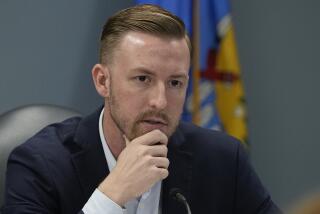Church Leaders Join Against Prayer Bill
- Share via
Warning that religious freedom would be undermined by allowing organized prayer in public schools, a coalition of Buddhist, Christian and Jewish leaders called this week for defeat of a proposed constitutional amendment to permit classroom prayer.
The amendment, sponsored by House Majority Leader Richard Armey and backed by the Christian Coalition, is expected to win approval soon in a congressional committee and be sent to the House of Representatives for a showdown vote.
None of the Southern California religious leaders who called for its defeat expect the amendment to survive the long process of House and Senate votes and then ratification by the states. But they contend that Armey is moving the proposed amendment on a “fast track” to force House members to cast votes before the November election.
“This amendment is not about religious freedom but rather about politics,” the Rev. Clara Mills, the United Church of Christ’s conference minister for church and society, told a news conference this week.
The American Jewish Congress’ David Waskow said Armey is moving fast at the behest of the Christian Coalition, which wants to include the House vote in its November election voter guides.
The American Jewish Congress is launching a statewide “Pray for Our Schools, Not in Our Schools” campaign and is asking other social and religious groups to join the “petition, educational and advocacy campaign . . . to get our schools back on track.”
The group’s press conference denouncing the amendment Wednesday drew a dozen religious leaders to Logan Elementary School in Echo Park.
Carol Levy, executive director for the group’s Pacific Southwest region, said the amendment was dangerously vague.
“It is stealth language for allowing some students and teachers to impose their religious practice on captive student audiences from other religious traditions,” Levy said.
The Rt. Rev. Chester L. Talton, Suffragan (assistant) bishop of the Los Angeles Episcopal Diocese, said that public school pupils already have the right to have private prayer and devotions, Bible readings and discussions of religion with other willing students.
“As a person of faith,” Talton said, “I don’t want to have the government or any other group provide worship or prayer for me or for my family.”
Opponents of the legislation acknowledged that large segments of the public are alarmed by rising crime and view with alarm the moral climate in the country. But they said prayer in public schools is not the answer.
“There’s a confusion here of morality with religion,” Mills said. “Children must be taught self-respect and respect of others. . . . They must be taught that every individual regardless of race, creed or color is created equally. Children must be taught more than tolerance. They must be taught to affirm the dignity and equality of every individual.”
Others at the news conference were the Rev. Kathy Cooper-Ledesma, chairwoman of the California Council of Churches and United Methodist Church minister; the Rev. Albert Cohen, executive director of the Southern California Ecumenical Council; the Venerable Havanpola Ratanasara, president of the Buddhist Sangha Council of Southern California; The Venerable Karuna Dharma, vice abbot of the College of Buddhist Studies in Los Angeles; the Rev. Ernie Pipes of the Unitarian Universalist Project Freedom of Religion; Episcopalian Deacon Josephine Borgeson; the Rev. Ignacio Castuera, vice chairman of the Progressive Religious Alliance and pastor of the North Glendale United Methodist Church, and Elder Melvin Jacobson of the Seventh-day Adventist Church.
More to Read
Get the L.A. Times Politics newsletter
Deeply reported insights into legislation, politics and policy from Sacramento, Washington and beyond. In your inbox twice per week.
You may occasionally receive promotional content from the Los Angeles Times.










